
See our fourth cohort of Zero-Cost Heroes (Est. March 2023)
The Open Education Resources (OER) Working Group of the River Campus Libraries (RCL) has implemented an OER grant program and identified more low-cost/increased-access champions across campus. As part of Open Education Week/Month 2022, we proudly announce 11 new Zero-Cost Heroes, bringing our total number to 21 (see heroes of our first and second rounds). Of the newly inducted heroes, two have been awarded an OER grant to modify a course that embeds open pedagogical practices and asks students to develop open educational materials from which professionals in the counseling field can benefit.
All of our selected heroes are instructors and faculty who, for a number of reasons, have chosen to select or create course materials that are free for their students. Each day we'll be highlighting one hero, sharing their motivations for championing free course materials, how they've worked with the library to make it happen, and what their students have to say about zero-cost materials.
Highlighting Zero-Cost Heroes is part of an ongoing RCL effort to ensure equity, access, and empowerment for all Rochester students. Other examples of this effort include the ACT commitment and much of what is found on the Open Education Services page, where you can view a number of presentations from our OER and Open Pedagogy workshop series.
Want to nominate someone as a Zero-Cost Hero? Email us at rclconsult@library.rochester.edu.
Monday’s Zero Cost Heroes: The River Campus Libraries’ Course Reserves Team
Pictured top to bottom (moving clockwise), left to right: Marc Bollman, Alex Kurland, Jeff Jones, Maggie Bentley, Tom Clifford, Teddy Scheuerman
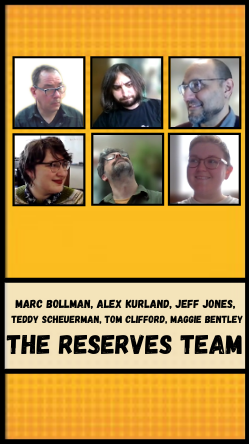
Course reserves service itself implies cost-saving in that it allows students to share resources.
Occasionally, Zero-Cost Heroes function as a team to solve large-scale service issues, and the River Campus Libraries (RCL) Course Reserves team is a perfect example.
Course Reserves is a long-established, well-known service on campus. The team’s mission is to support students and faculty by facilitating equitable paths to digital and physical course readings, films, and other materials. They do this by placing items “on reserve,” removing them from the general circulating collections; high-demand items are assigned shortened loan periods to ensure availability for the most borrowers possible. A similar practice exists for digital course reserves—ideally the materials are acquired with licensing for unlimited users, so that others can access the same item simultaneously.
COVID-19 required the libraries to rethink Course Reserves. In the past, it was a convenience, but the pandemic, and all the service challenges it brought, has made the service an essential part of providing students with equitable access to course materials that might not be readily available otherwise. Now, Course Reserves is built to accommodate online, in-person, and blended teaching and learning.
Course Reserves staff do all they can (legally) to remove geographic and economic barriers to e-resources, so students and faculty have access wherever they are. The staff works collaboratively with other library staff and faculty to ensure that required course materials are always accessible for students.
Here are a few ways that the Course Reserves team supports student and faculty access to course resources:
-
They provide diligent and timely fulfillment of course reserve requests from faculty who fill out the online form.
-
They place requests for electronic versions of materials, and if possible, material with an unlimited number of simultaneous users. Electronically available materials acquired by a library have different licensing restrictions than those purchased for individual use. See UR’s Access to Course Textbooks (ACT Commitment).
-
They connect instructors to liaison librarians who help track down alternative e-resources when the original is not available in electronic format.
In sum, the Course Reserves team increases student access to and reduces the costs of course materials.
Tuesday’s Zero Cost Hero: Justin Russotti
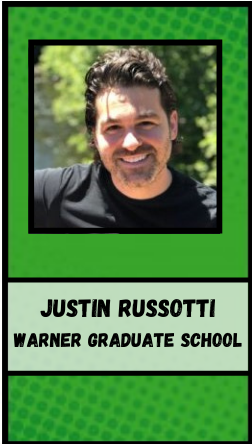
For years, Justin Russotti ʼ19W(PhD) has taught graduate courses at the University through the Warner School of Education in the areas of clinical practice, developmental psychopathology, and the neurobiological foundations of mental health. In that time, he’s partnered with the River Campus Libraries to keep student costs for textbooks and other course assignments as low as possible.
For Russotti’s summer course, “Counseling Interventions for Children and Adolescents,” he has seven texts available through the library’s ebook reserves. He’s also worked with the library to secure video streaming for films relevant to his course, so that students can read and watch their assignments whenever and wherever it’s convenient for them.
“Knowing how much our students invest in their graduate experience, I feel compelled to ensure they get the most out of their investment and that we are fully leveraging what the University has to offer,” says Russotti. “Further, when we can create courses that utilize existing resources, keep costs low, and make materials available electronically, we can increase accessibility and make our graduate programs more equitable.”
Do students recognize the financial benefits of Russotti’s efforts? “Absolutely,” he says, but the dollars and cents of the issue is just the tip of the iceberg. There’s also value in the students’ engagement with the library. Once they’ve used one library service, they’re more likely discover other ways the library can be helpful to them.
“I also think it fosters students’ appreciation for the larger River Campus Library system,” says Russotti, "and everything else they have access to on our campus. It also encourages them to develop and hone their skills in utilizing the library system, finding resources, and engaging in the research process.”
Wednesday’s Zero Cost Hero: Jeffrey Tucker
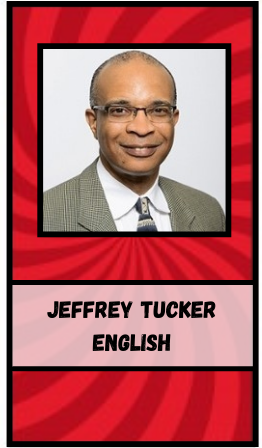
Jeffrey Tucker, professor of English and African American Studies, has taught courses covering a variety of topics and genres, including African American autobiography, literature of the Harlem Renaissance, science fiction, novels, and comic books.
Tucker relies on the libraries’ Course Reserves service to ensure that his students can easily access the literature that they are assigned to read in all of his classes. “A student may have difficulty obtaining a text for any of a variety of reasons,” says Tucker. So, for the spring 2022 semester, Tucker placed a number of novels on reserve for his course “Slavery and the African American Novel.”
Tucker’s spring course examines the impact of slavery on African American literature into the 20th and 21st centuries, through the lens of the “neo-slave narrative,” a term coined by author Ashraf Rushdy, the Benjamin Waite Professor of the English Language at Wesleyan University. Tucker explains that for this course he has chosen to assign novels that spark a conversation about “how Americans and African Americans confront the history of slavery and address how painful that history is, but also how necessary that confrontation is.” And because he has ensured equal access to the readings, he has created an environment where all students are able to participate in the discussion. Although the course focuses mainly on novels, the neo-slave narrative is also present in other forms of media. “A number of the works that we're reading have been adapted for film or television,” explains Tucker, citing the 1998 movie adaptation of Toni Morrison’s Beloved and the upcoming television series based on Octavia Butler’s Kindred.
It’s common for students studying film and television adaptations to encounter accessibility issues, as most of these works are housed in subscription streaming sites. Whenever possible, Tucker and his colleagues in the English department point students toward Kanopy, a movie streaming service that is available to all University of Rochester students through the library.
Having texts on reserve at the library gives students an easy and reliable access to the literature they need. Tucker notes there’s an added bonus to having students use library resources for his courses. “It brings students into the library,” he says. “It gets them more familiar with it and what it offers.”
Thursday’s Zero Cost Hero: Kristana Textor
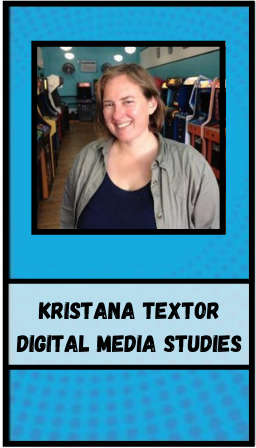
Digital media studies instructor Kristana Textor uses open source material in her classroom as a method of bridging the gap between traditional scholarship and the general public. Open sources help researchers disseminate their scholarship to audiences beyond academia, which helps to build a more equitable and digitally literate world by making knowledge more accessible knowledge.
In addition to being a doctoral student at the Warner School of Education, Textor teaches “Introduction to Digital Media Studies” and “Writing 105: Video Games and Play.” She likes to think of scholarship beyond traditional textbook resources, saying “it opens us up to a wider audience, which ultimately impacts perceptions and policies in the real world.” And the library has been key to her ability to support open, digital scholarship. She specifically calls out library resources and workshops for digital assets and frequently uses films, TV shows, and video games from the Art and Music Library.
Although choosing open sources is sometimes a messy process and doesn’t always work, Textor finds it worthwhile in terms of student impact. The cost benefits are especially appreciated since those textbooks will be out of date in a few years.
Textor credits the library as a major asset in transitioning to open materials and media. Librarians can help instructors through the process of using open sources and ensure they get the most useful tools into the hands of the students.
Friday’s Zero Cost Heroes: Scott McGuinness and Kyle Sullivan
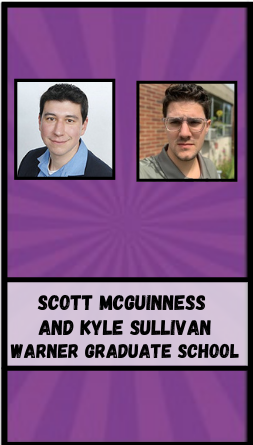
The counseling profession is in desperate need of more individuals trained in the areas of substance abuse and addiction. According to the Centers for Disease Control and Prevention, more than 100,000 Americans died from a drug overdose between November 2020 and November 2021.
Scott McGuinness ʼ20W (PhD), an assistant professor of counseling and human development, and Kyle Sullivan, a current doctoral student, at the Warner School of Education, are working to address that by setting a new precedent for open pedagogy and open education in the field of counseling. Keeping education costs down is an important step in the process.
Sullivan is well aware that student debt is a burden that is felt after graduation. “For me, providing a zero-cost course means that we are reducing the dollars students spend on their already expensive education,” he says.
In fall 2021, McGuinness and Sullivan received an open education grant from the River Campus Libraries. Their goal: redesign the course “Addictions Counseling and Prevention” so that it includes open pedagogy, allowing students to create open-access materials. Sullivan and McGuinness are excited to share their work with other counselor educators, which they can do because creating openly licensed materials makes them accessible to many people, including practitioners and faculty who may not otherwise have access to this knowledge base.
“Now we get to collaborate and see where our initial work is further developed,” says Sullivan. He adds that one of the benefits is that the impact extends beyond the classroom, ensuring it will be shaped by a range of expertise and diverse perspectives.
Redesigning a class takes a lot of time and energy. But it’s hard to argue against the value—and results—of the work McGuinness and Sullivan. “Seeing our graduate students come together and use their exceptional skills and talents to synthesize, organize, and create resources has been a real joy,” says McGuinness.


